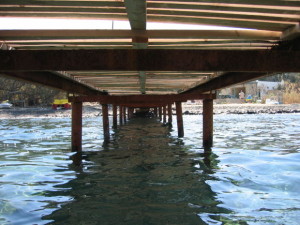NO FEES unless we recover money for you. |
Call 205-391-0618
Office Locations: Tuscaloosa Birmingham
Blog
Cracchiolo v. E. Fisheries, Inc. – Duty of Care Exists in Slip-and-Fall Cases
Jan 18, 2014 - Birmingham, Personal Injury by Cross & Smith
Property owners – especially those located in potentially hazardous surroundings – must ensure that the site is safe for those who enter.
For example, that could mean keeping the floors dry or the walls and ceilings properly-patched. In the case of a fishery pier, it would mean proper maintenance of facilities and ensuring safe egress and ingress.
These responsibilities are referred to as “duty of care.” When duty of care is breached, resulting in injuries, those affected may pursue filing a Birmingham slip-and-fall lawsuit. This is true even when there is evidence that there may have been some wrong-doing or negligence on the part of the person who fell.
This was the case in Cracchiolo v. E. Fisheries, Inc.. Although initially resulting in a summary judgment for the defense, the U.S. Court of Appeals for the First Circuit recently reversed that decision, paving the way for the case to move forward.
According to court records, the victim worked on a commercial fishing boat, were at the dock shortly after midnight one night in late January. Suddenly, while trying to get back onto the boat, the husband slipped on a patch of the pier that was obviously hazardous. He drowned.
His wife subsequently sued, alleging that the facility failed to exercise due care in maintaining and repairing the premises and in failing to provide a safe and reasonable means to get on and off the boat – especially on a night like that where the dock was covered with ice and snow.
The district court initially determined that the owners of the pier had no duty to remedy the hazards under the weather conditions that night. As such, the court granted a summary judgment.
However, the appellate court found the dismissal improper.The key issue here was that the area where the worker fell was near a regularly-used gap in the fence, where boat crew members would frequently enter and exit when the facilities were locked and they didn’t have a key. Such instances apparently occurred quite frequently, and the owner of the property was aware of this, However, there was never any effort to repair the fence.
With the defendant’s knowledge, the worker in this case had stayed on site overnight at the property to make repairs on his company’s boat, and it was expected he would be coming and going from the property during this time for various tools and parts.
He and his co-worker left the pier at one point to have dinner and drinks, returning separately. Video footage would later show the victim, after being dropped off by a cab, entering the property through the back gate, walking out onto the ice-covered dock, slipping and falling into the water and never emerging. He was found in the water by his co-worker the next morning.
It was later determined he had a blood-alcohol level of 0.18 percent.
Upon reviewing the lower court’s summary judgment, the appellate court considered the fact that just because a hazard is open and obvious does not negate the property owner’s obligation to remedy it. While the man’s decision in this case to encounter an ice hazard could be deemed unreasonable, and therefore an issue of comparative negligence, that would be a fact for a jury to decide. Further case law indicates that just because a plaintiff may have been negligent in encountering a danger doesn’t relieve the landowner of a duty to remedy that danger where such a negligent act should be anticipated by the landowner. Comparative negligence doesn’t eliminate the defendant’s duty of care.
In other words, the worker’s negligence in entering a snowy, icy dock through a gap in the gate after drinking doesn’t necessarily negate the property owner’s responsibility to mitigate these risks – risks of which they were well aware. On these grounds, the trial will be allowed to move forward.
While Alabama applies the law of contributory negligence as opposed to comparative negligence, the First Circuit holding is helpful in understanding the duty of property owners in slip and fall cases.
Additional Resources:
Cracchiolo v. E. Fisheries, Inc., Jan. 15, 2014, U.S. District Court of Appeals for the First Circuit
Categories
- Amputation
- ATV/SUV Rollover Accidents
- Bessemer
- Birmingham
- Bus Accidents
- Car Accidents
- Construction Accidents
- Dangerous Products/Liability
- Defective Medical Devices
- Drunk Driving Accidents
- Firm News
- Medical Malpractice
- Motorcycle Accidents
- Nursing Home Neglect
- Personal Injury
- Pharmaceutical Litigation/Dangerous Drugs
- Premises Liability
- Train Accidents
- Truck Accidents
- Tuscaloosa
- Uncategorized
- Workers' Compensation/Work Injury
- Wrongful Death
Archives
Get a Free Consultation No Recovery. No Fee.
Hear What Our Clients Have To Say
"We realize there are many options for representation out there, and we talked with several of the “big names” before finding Cross and Smith. With the others, it felt like we were being bullied, in a tank with hungry sharks. We are still receiving junk mail from some. We are SO thankful we were referred to Justin Smith (Cross and Smith) for our accident claim. He and his team were absolutely amazing."
Posted By: Jamie Wyatt

